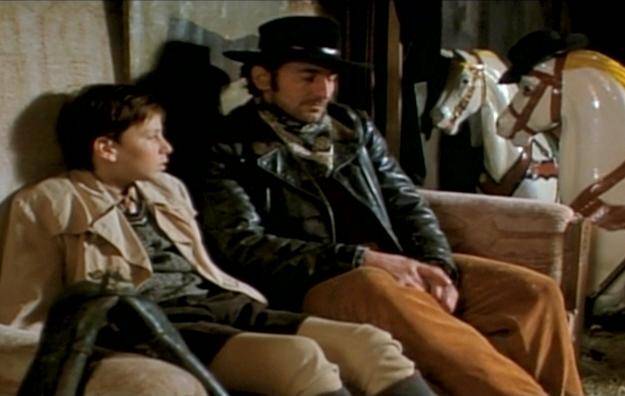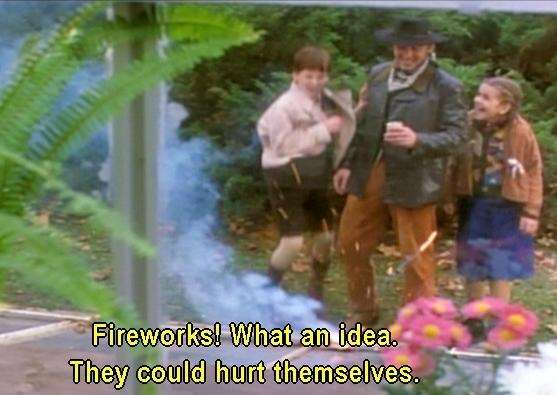
All My Loved Ones (Czechoslovakia, 1999)

Figure 1.-- David talks with his Uncle Max, an itinerant circus propriator who
comes to live with David's family (i.e., with the Dr. Jacob Silbersteins).
Notice the rather loose-fitting tan long stockings which David wears with
short pants on chilly days. He is very fond of Uncle Max, although his bohemian uncle somewhat disrupts the respectable routine of the upper middle-class family when he comes to stay.
|
|
This is a very moving film about a Jewish Czech familiy. The Czechs were the first foreign Jews to fall into NAZI hands after the Munich Conference when Britain and France abandoned Czechoslovakia. The film addresses the terrible decession faced by Jewish families in Austria, Czechoslovalia, and Germany--of parting with their children. The Silbersteins, who give up their young boy David to a Kindertransport scheme in order to save him from the NAZIs in the months leading up to World War II. The story was inspired by the heroics of
Nicholas Winton, an English stockbroker who saved hundreds of Czech Jewish
children from the Nazis. The Silbersteins are a large and close knit extended
family living a good life in the Czechoslovakian countryside. Believing in
the decency of mankind, they don't pay much heed to the the developing NAZI threat at first. But, little by little, as their daily life becomes more and more
intolerable and their personal effects are stipped away, they realize the true
horror of what is coming, but their recognition comes too late.
The Czechs were the first foreign Jews to fall into NAZI hands after the Munich Conference when Britain and France abandoned Czechoslovakia. Hitler in total violation of the Munich agreement ordered the Wehrmacht to seize the rest of Czechoslovakia--Bohemia and Moravia. German troops marched into Prague on March 15, 1939. Later Hitler ordered the rest of the country occupied in violation of the Munich Agreement (March 1938). Britain and France protested diplomatically, but took no action. The Germans established a "protectorate." The Slovaks succeed from Czechesoslavakia and set up slavishly compliant pro-NAZI state. The Czechs people suffered during the German occupation. Losses during World War II, however, were not as great as in many other countries, especially Poland to the north. The major exception were the Czech Jews. I have little information on actions against the Czech Jews at this time. The Einsatzgruppen which murdered so ruthlessly in Poland and the Soviet Union were to my knowledge not employed in Czechoslovakia. Czechoslovakia was, however, the foreign country occupied by the NAZIs for the longest period. Few Czech and Slovakian Jews survived. More than 70,000 were killed by the NAZIs. A concentration camp was set up at Thereisenstadt which the NAZIs used as a model camp to show the Red Cross and Western journalists on fact-finding missions. Hitler appointed Heydrich Reichsprotector when he preceived that Neurath was being too lenient. [Michaelis and Schraepler, p. 244.] The SS conducted operations against Slovakian Jews and were assisted by the Slovakian puppet government (March-September 1942).
Filmology
This is a very moving film about a Jewish Czech familiy. The director was Matej Minac. The story is a compeling one. Some reviewers were not impressed with the director's storytelling. It is a little difficult to assess these foreign films withour being able to understand the dialog in the original language. The film is depicted with considerable historical accuracy. The film addresses the terrible decession faced by Jewish families in Austria, Czechoslovalia, and Germany--of parting with their children.
Cast
The cast included: Rupert Graves, Josef Abrham, Jiri Bartoska, and
Hanna Dunowska. David is played by Brano Holicek.

Figure 2.--Here we see David wearing a tan windbreaker, dark short trousers,
tan long stockings, and calf-high boots. This is his informal dress for play
in many of the scenes with Uncle Max. Uncle Max is proposing to entertain the
children with fireworks, somewhat to the disapproval of David's mother. David
is with his best friend, a girl called Sosha with whom he has a pre-adolescent
but idealistic romance.
|
|
The Silbersteins, who give up their young boy David to a Kindertransport scheme in order to save him from the NAZIs in the months leading up to World War II. The story was inspired by the heroics of Nicholas Winton, an English stockbroker who saved hundreds of Czech Jewish children from the Nazis. The Silbersteins are a large and close knit extended family living a good life in the Czechoslovakian countryside. Believing in the decency of mankind, they don't pay much heed to the the developing NAZI threat at first. But, little by little, as their daily life becomes more and more intolerable and their personal effects are stipped away, they realize the true horror of what is coming, but their recognition comes too late. Knowing their inevitable fate, the Silbersteins have to make their toughest decision ever--to turn over their beloved boy David to Nicholas Winton (played by Robert Graves)--of course never to see him again. The Silberstein family live in Prague, where David's father has a respected career as a physician. The members of the extended family include a travelling circus manager, a gypsy of sorts, and a distinguished concert violinist.
David's clothes seem to be very accurately reproduced for 1939, the year in
which the story is set. David is about 10-11 years old. His dress-up clothes
consist of a cream-colored short-pants suit (single breasted) worn with shirt,
tie, and knee socks. His school clothes consist of short pants worn with
suspenders and knee socks. During the chillier months he wears tan long
stockings with his shorts and what look like calf-length boots. For his trip
to England he graduates to long trousers.
Many of the children, especially the younger ones, did not fully understand what was happening with the Kindertranport. They were too hyoung to fully understand the dangers. Some were terrified of leaving their parents. Some condidered it a gran adventure. Think what it must have been like for the parents to send their children off in to the unknown. Here we see David at the train station wearing his transport number, surrounded by his adoring family.
HBC

Navigate the Boys' Historical Clothing Web Site:
[Return to the Main Aa-Al movie page]
[Introduction]
[Activities]
[Biographies]
[Chronology]
[Clothing styles]
[Countries]
[Bibliographies]
[Contributions]
[FAQs]
[French glossary]
[Satellite sites]
[Tools]
[Boys' Clothing Home]
Created: 9:47 PM 10/21/2005
Last updated: 2:48 AM 10/31/2005




